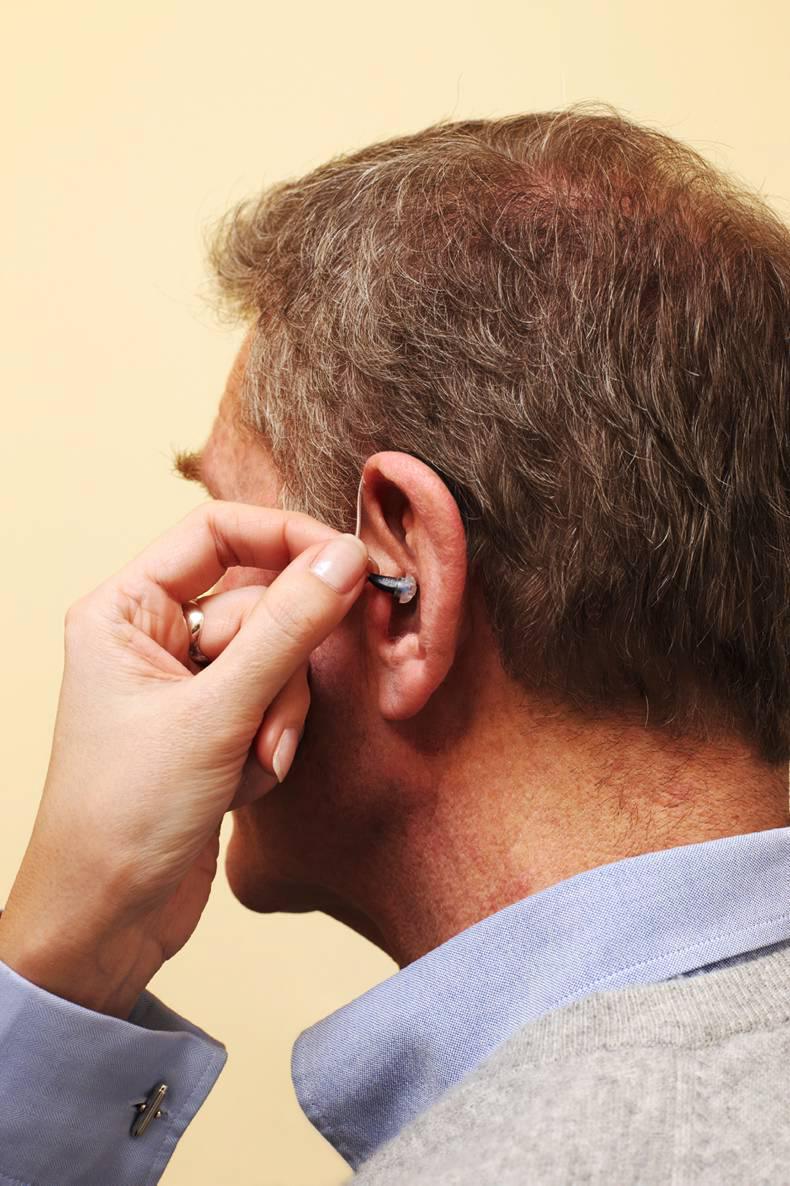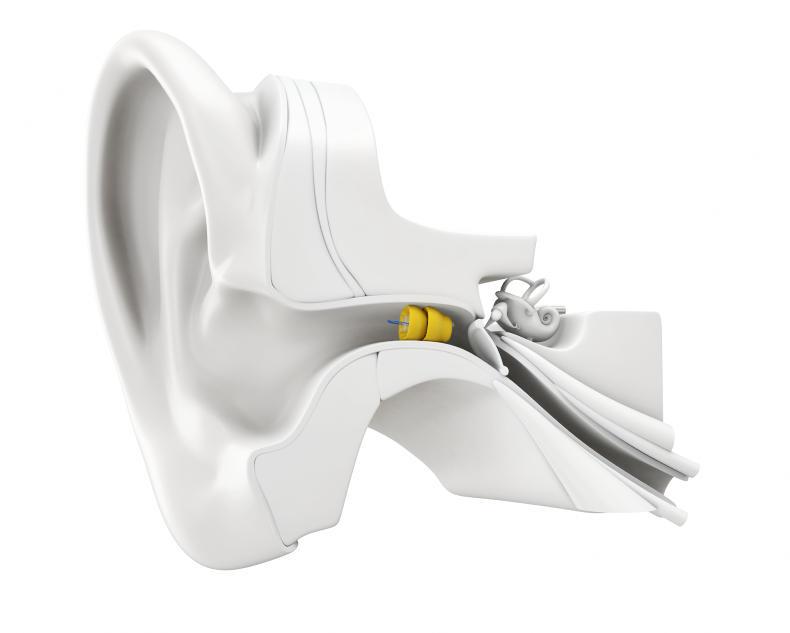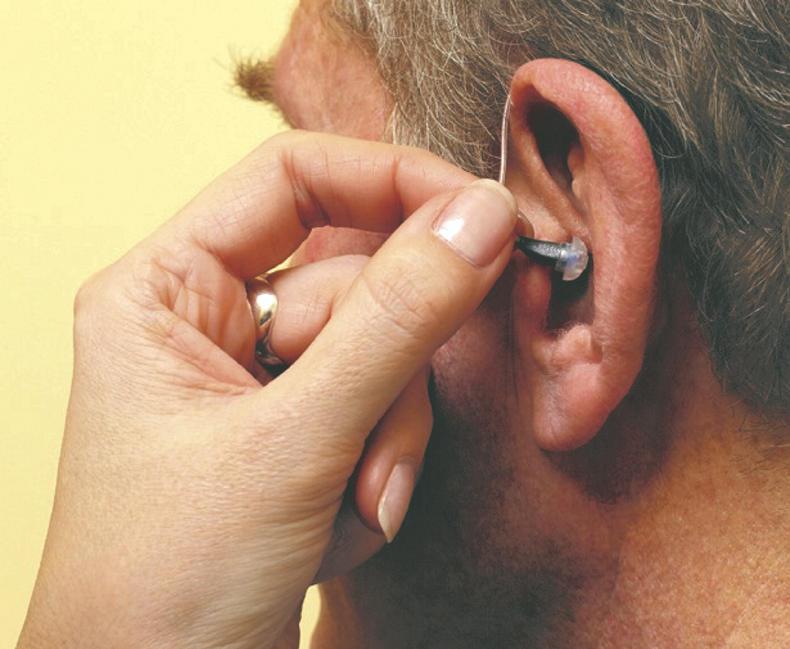Can you hear a pin drop on the shed floor? Or a nail? Or would it have to be an iron bar clunking on to the ground before the sound would register? Farmers are particularly prone to hearing loss because of the nature of their work, according to Cork-based Specsavers audiologist Rory Perry.
“I’d see many farmers with noise damage and hearing loss from long-term machinery use,” he says.
“With limited or no ear protection, this will, in most cases, cause some kind of hearing loss. If you’re spending six or seven hours a day on a tractor or in a milking parlour and doing it every day, that repetitive duration of noise at that level will eventually cause a deadening of the nerve hair cells within the ear.”
Any sound metered over 85 decibels can damage hearing, he says.
For the purposes of this article and to highlight farm noise levels, we asked a dairy farmer to download a free decibel meter onto his smartphone and record the noise levels related to his two most common daily tasks. These are the results:
• Milking parlour – 82 dBA (in pit) 86 dBA in rest of parlour (three to four hours a day spent there).• In telescopic loader feeding cattle silage 85-90 dBA (takes one to two hours a day).Farmers, like all other sectors of society, are slow to acknowledge that their hearing has deteriorated,”says Rory.
“Research shows that it’s seven years (of being aware of hearing problems) before people do anything about it, ie get a hearing test done or get a hearing aid.”
Hearing loss happens very gradually, he says.
“What happens is that people say, at first, that other people are mumbling or that accents catch them. It takes a long time before they realise or admit they have a hearing problem. Stigma around wearing hearing aids may also contribute to the delay.”
Rory Perry finds it strange that people will get glasses when they need them but not hearing aids when their hearing deteriorates.
“In a lot of cases, it’s the person having difficulty facing up to ageing. You think, ‘I’m getting old and I don’t want to accept that’. Hearing loss is perceived as being an old person’s problem. Hearing aid technologies have moved on hugely though. They are now extremely hi-tech and discreet and can be tailored to the person’s needs.”
There are even digital hearing aids that talk to each other too, he says.
“You’ve got the parent hearing aid in the left ear and another in the right that are wirelessly connected. They can adjust each other and themselves. You can also get hearing aids that have a remote control that allows you to adjust the hearing aids themselves. There are also aids with microphone systems and Bluetooth. There’s a whole load of technologies that weren’t there years ago.”
Any sound metered over 85 decibels can damage hearing, he reiterates.
“Being in a noisy situation for a few hours, eg at a wedding or concert where the music is very loud, can cause discomfort, but it’s usually only temporary. With farmers, it’s the amount of time spent in the noisy environment over years and years that’s likely to cause the hearing loss.”
However, sudden, intense sounds can cause damage straight away.
“High, intense, very powerful sounds at ear level or arm’s length, like when shooting a gun or using a chainsaw, have the potential to cause immediate damage. Ear protection has to be worn in these situations.”
TYPE OF HEARING AID
The kind of hearing aid that you need will depend on your lifestyle, he adds: “If you’re elderly and you don’t go out that much, you won’t have to buy a hearing aid with bells and whistles on it. If you’re on a committee, however, and it’s important to you to hear in group situations, you’ll need to spend a bit more.”
PRSI TREATMENT BENEFIT
If you are eligible for the PRSI Treatment Benefit Scheme (ie if you have the required number and kind of social insurance contributions), the Department of Social Protection will pay for half of the cost of a hearing aid, up to a maximum of €500 for a single aid, or up to €1,000 for a pair.
According to the Department: “Hearing aids may be provided by suppliers who have a contract with the Department of Social Protection. The Department pays half the cost of a hearing aid, subject to a fixed maximum of €500 for each hearing aid, every four years. It also pays half the cost of repairs to aids.”
You will need to fill out form MA. Forms are available from the person selling you the hearing aids or from the treatment benefit section. Lo-call 1890-400-400 or see www.welfare.ie for more information.
Useful websites
www.specsavers.ie
www.welfare.ie
www.deafhear.ie
www.hsa.ie
www.teagasc.ie
www.ishaa.ie
CASE STUDY
John is a 62-year-old farmer who is having trouble with his hearing. This is what he had to say: “I don’t want to face up to wearing a hearing aid. I had one of those free computer hearing tests done lately, after my wife persuaded me to go in, and it showed that the hearing in my right ear wasn’t great, but I haven’t done any more about it.
“I say it’s the cost of it but it’s not really that. I don’t want to think of myself as needing one. I’m not that old. I’ve farmed all my life and never wore ear muffs until lately – even now I have to be nagged to put them on when I’m using the chainsaw or the angle grinder, which doesn’t make sense, I suppose, when I know I’ve already damaged my hearing by doing stuff like that.
“I don’t know what it is – something about looking like a sissy if you wear stuff like that. Younger farming lads seem to have more sense about it, but they’ve had all the health and safety training in college and stuff and they have tractors with better cabs on them. There were no cabs when I started. Right now I have to have my phone permanently set to speakerphone so I can hear who I’m talking to. They’re also shouting at me at home for having the television turned up so high. One of these days I’ll have to do something.”
Tip
You can download a hearing test app on your smartphone.
Decibel meters are also available as free apps and
allow you to measure the noise level that you’re working in, eg milking parlour
or tractor.
HEALTH BRIEFS
NOISE LEVEL EXAMPLES:
Damage is caused over 85 dBA and over 130 dBA causes pain.
Chainsaw: 95-129 dBALawnmower: 90-120 dBARock concert: 90-120 dBAFootball game: 100-120 dBACinema: 72-104 dBAPig squeals: 130 dBAHenhouse: 105 dBANote: Use recommended standard HPDs (hearing protection devices). Read the manufacturer’s information before buying.
Teagasc
Remember that:
• Once hearing damage occurs, it can’t be repaired. • Noise can also be a safety hazard at work, interfering with communications and making warnings harder to hear. • Ear protection must be used if noise levels are above 85dB. DeafHear
DeafHear is the organisation that advocates for equality and better services for those who are deaf or have hearing loss. Deafhear makes the following points about the impact of hearing loss:
• Only one-third of people in Ireland who would benefit from hearing aids have them fitted.• People with hearing loss are more likely to be socially isolated and to develop dementia.• Hearing loss has a massive negative impact on people’s lives due to it affecting a person’s ability to communicate.• Hearing loss is on the increase among young people.• One third of hearing loss is preventable, particularly loss caused by noisy workplaces and listening to loud music.• It will soon be one of the top 10 most costly health conditions in developed countries, the WHO says. By 2030, it is expected to be more costly than diabetes.Tips
• Wear ear protection. • Always be mindful of noise levels.• Reduce the volume or increase distance from sound.• Get your hearing tested often.Earmuffs
Here’s some advice from the Health and Safety Authority:
• Make sure they cover your ears, fit tightly and there are no gaps. • Don’t let hair, glasses etc interfere with the seal. • Keep ear cups and cushions clean and replace as required. • Don’t stretch the headband too much – make sure it keeps its tension. Note: Specsavers Hearing will be carrying out complimentary hearing tests at the Active Over 50s show in Cork City Hall on 7-8 March.
Can you hear a pin drop on the shed floor? Or a nail? Or would it have to be an iron bar clunking on to the ground before the sound would register? Farmers are particularly prone to hearing loss because of the nature of their work, according to Cork-based Specsavers audiologist Rory Perry.
“I’d see many farmers with noise damage and hearing loss from long-term machinery use,” he says.
“With limited or no ear protection, this will, in most cases, cause some kind of hearing loss. If you’re spending six or seven hours a day on a tractor or in a milking parlour and doing it every day, that repetitive duration of noise at that level will eventually cause a deadening of the nerve hair cells within the ear.”
Any sound metered over 85 decibels can damage hearing, he says.
For the purposes of this article and to highlight farm noise levels, we asked a dairy farmer to download a free decibel meter onto his smartphone and record the noise levels related to his two most common daily tasks. These are the results:
• Milking parlour – 82 dBA (in pit) 86 dBA in rest of parlour (three to four hours a day spent there).• In telescopic loader feeding cattle silage 85-90 dBA (takes one to two hours a day).Farmers, like all other sectors of society, are slow to acknowledge that their hearing has deteriorated,”says Rory.
“Research shows that it’s seven years (of being aware of hearing problems) before people do anything about it, ie get a hearing test done or get a hearing aid.”
Hearing loss happens very gradually, he says.
“What happens is that people say, at first, that other people are mumbling or that accents catch them. It takes a long time before they realise or admit they have a hearing problem. Stigma around wearing hearing aids may also contribute to the delay.”
Rory Perry finds it strange that people will get glasses when they need them but not hearing aids when their hearing deteriorates.
“In a lot of cases, it’s the person having difficulty facing up to ageing. You think, ‘I’m getting old and I don’t want to accept that’. Hearing loss is perceived as being an old person’s problem. Hearing aid technologies have moved on hugely though. They are now extremely hi-tech and discreet and can be tailored to the person’s needs.”
There are even digital hearing aids that talk to each other too, he says.
“You’ve got the parent hearing aid in the left ear and another in the right that are wirelessly connected. They can adjust each other and themselves. You can also get hearing aids that have a remote control that allows you to adjust the hearing aids themselves. There are also aids with microphone systems and Bluetooth. There’s a whole load of technologies that weren’t there years ago.”
Any sound metered over 85 decibels can damage hearing, he reiterates.
“Being in a noisy situation for a few hours, eg at a wedding or concert where the music is very loud, can cause discomfort, but it’s usually only temporary. With farmers, it’s the amount of time spent in the noisy environment over years and years that’s likely to cause the hearing loss.”
However, sudden, intense sounds can cause damage straight away.
“High, intense, very powerful sounds at ear level or arm’s length, like when shooting a gun or using a chainsaw, have the potential to cause immediate damage. Ear protection has to be worn in these situations.”
TYPE OF HEARING AID
The kind of hearing aid that you need will depend on your lifestyle, he adds: “If you’re elderly and you don’t go out that much, you won’t have to buy a hearing aid with bells and whistles on it. If you’re on a committee, however, and it’s important to you to hear in group situations, you’ll need to spend a bit more.”
PRSI TREATMENT BENEFIT
If you are eligible for the PRSI Treatment Benefit Scheme (ie if you have the required number and kind of social insurance contributions), the Department of Social Protection will pay for half of the cost of a hearing aid, up to a maximum of €500 for a single aid, or up to €1,000 for a pair.
According to the Department: “Hearing aids may be provided by suppliers who have a contract with the Department of Social Protection. The Department pays half the cost of a hearing aid, subject to a fixed maximum of €500 for each hearing aid, every four years. It also pays half the cost of repairs to aids.”
You will need to fill out form MA. Forms are available from the person selling you the hearing aids or from the treatment benefit section. Lo-call 1890-400-400 or see www.welfare.ie for more information.
Useful websites
www.specsavers.ie
www.welfare.ie
www.deafhear.ie
www.hsa.ie
www.teagasc.ie
www.ishaa.ie
CASE STUDY
John is a 62-year-old farmer who is having trouble with his hearing. This is what he had to say: “I don’t want to face up to wearing a hearing aid. I had one of those free computer hearing tests done lately, after my wife persuaded me to go in, and it showed that the hearing in my right ear wasn’t great, but I haven’t done any more about it.
“I say it’s the cost of it but it’s not really that. I don’t want to think of myself as needing one. I’m not that old. I’ve farmed all my life and never wore ear muffs until lately – even now I have to be nagged to put them on when I’m using the chainsaw or the angle grinder, which doesn’t make sense, I suppose, when I know I’ve already damaged my hearing by doing stuff like that.
“I don’t know what it is – something about looking like a sissy if you wear stuff like that. Younger farming lads seem to have more sense about it, but they’ve had all the health and safety training in college and stuff and they have tractors with better cabs on them. There were no cabs when I started. Right now I have to have my phone permanently set to speakerphone so I can hear who I’m talking to. They’re also shouting at me at home for having the television turned up so high. One of these days I’ll have to do something.”
Tip
You can download a hearing test app on your smartphone.
Decibel meters are also available as free apps and
allow you to measure the noise level that you’re working in, eg milking parlour
or tractor.
HEALTH BRIEFS
NOISE LEVEL EXAMPLES:
Damage is caused over 85 dBA and over 130 dBA causes pain.
Chainsaw: 95-129 dBALawnmower: 90-120 dBARock concert: 90-120 dBAFootball game: 100-120 dBACinema: 72-104 dBAPig squeals: 130 dBAHenhouse: 105 dBANote: Use recommended standard HPDs (hearing protection devices). Read the manufacturer’s information before buying.
Teagasc
Remember that:
• Once hearing damage occurs, it can’t be repaired. • Noise can also be a safety hazard at work, interfering with communications and making warnings harder to hear. • Ear protection must be used if noise levels are above 85dB. DeafHear
DeafHear is the organisation that advocates for equality and better services for those who are deaf or have hearing loss. Deafhear makes the following points about the impact of hearing loss:
• Only one-third of people in Ireland who would benefit from hearing aids have them fitted.• People with hearing loss are more likely to be socially isolated and to develop dementia.• Hearing loss has a massive negative impact on people’s lives due to it affecting a person’s ability to communicate.• Hearing loss is on the increase among young people.• One third of hearing loss is preventable, particularly loss caused by noisy workplaces and listening to loud music.• It will soon be one of the top 10 most costly health conditions in developed countries, the WHO says. By 2030, it is expected to be more costly than diabetes.Tips
• Wear ear protection. • Always be mindful of noise levels.• Reduce the volume or increase distance from sound.• Get your hearing tested often.Earmuffs
Here’s some advice from the Health and Safety Authority:
• Make sure they cover your ears, fit tightly and there are no gaps. • Don’t let hair, glasses etc interfere with the seal. • Keep ear cups and cushions clean and replace as required. • Don’t stretch the headband too much – make sure it keeps its tension. Note: Specsavers Hearing will be carrying out complimentary hearing tests at the Active Over 50s show in Cork City Hall on 7-8 March.











SHARING OPTIONS